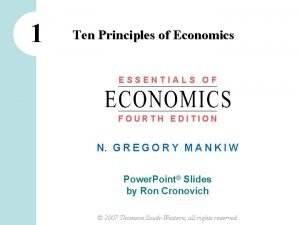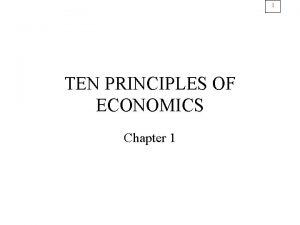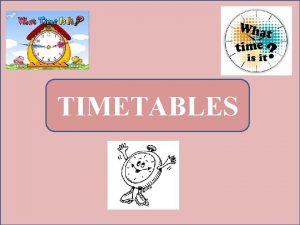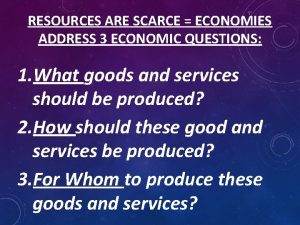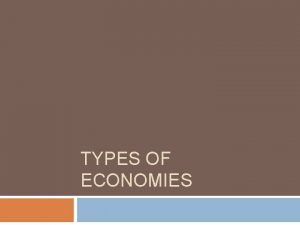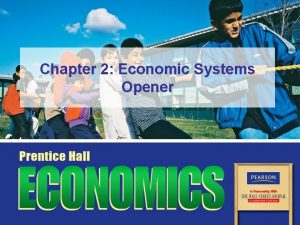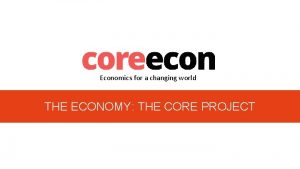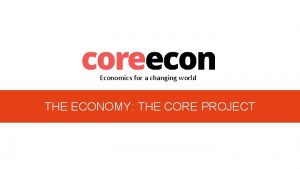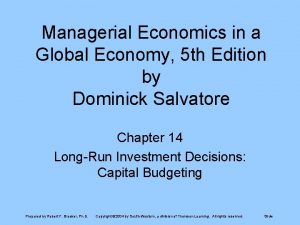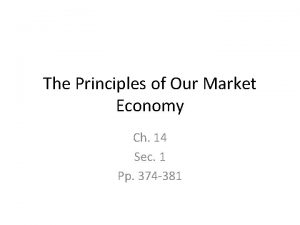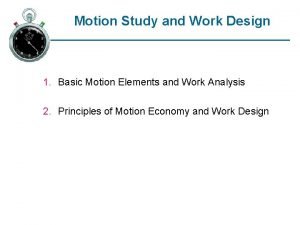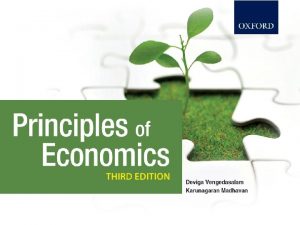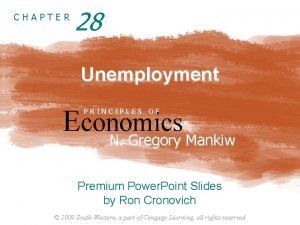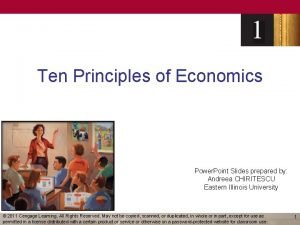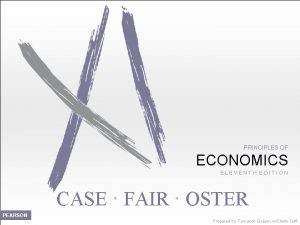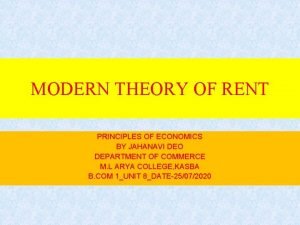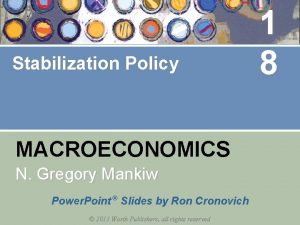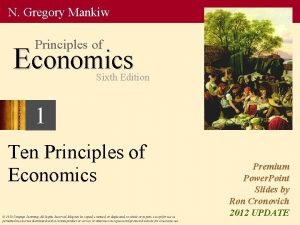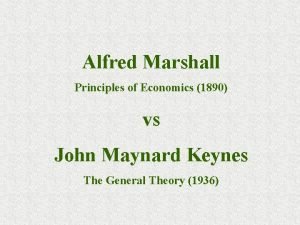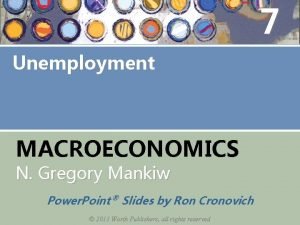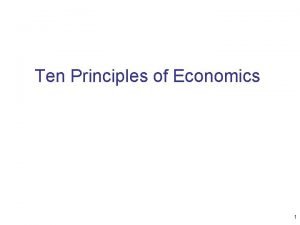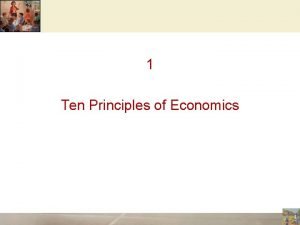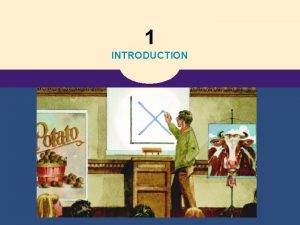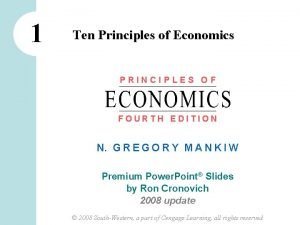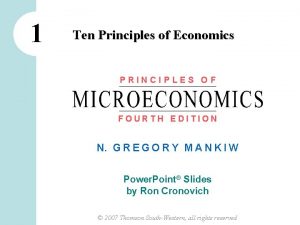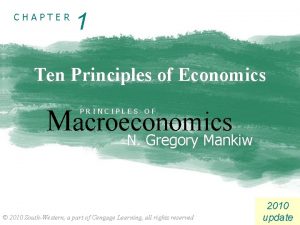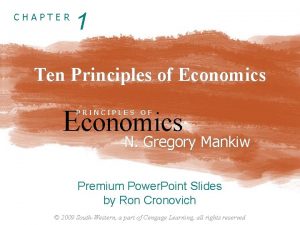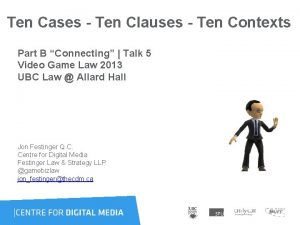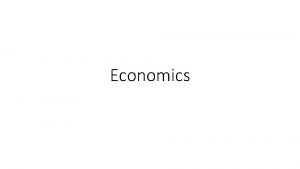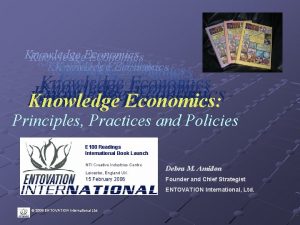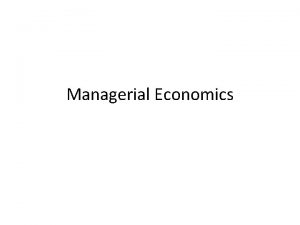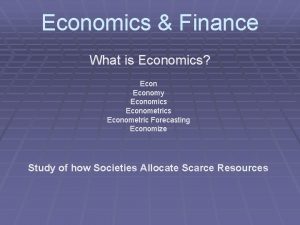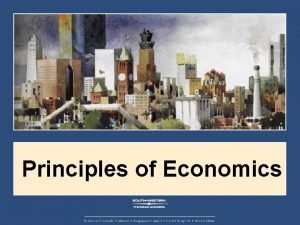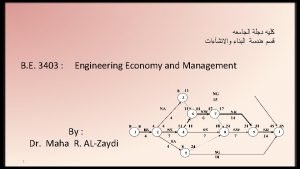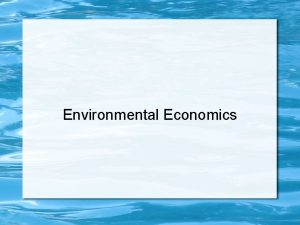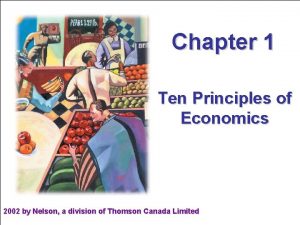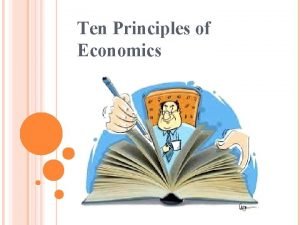Ten Principles of Economics Economy The word economy






































- Slides: 38

Ten Principles of Economics

Economy. . . The word economy comes from a Greek word for “one who manages a household. ”

TEN PRINCIPLES OF ECONOMICS A household an economy face many decisions: Who will work? What goods and how many of them should be produced? What resources should be used in production? At what price should the goods be sold?

TEN PRINCIPLES OF ECONOMICS Society and Scarce Resources: The management of society’s resources is important because resources are scarce. Scarcity. . . means that society has limited resources and therefore cannot produce all the goods and services people wish to have.

TEN PRINCIPLES OF ECONOMICS Economics is the study of how society manages its scarce resources.

TEN PRINCIPLES OF ECONOMICS How people make decisions. People face tradeoffs. The cost of something is what you give up to get it. Rational people think at the margin. People respond to incentives.

TEN PRINCIPLES OF ECONOMICS How people interact with each other. Trade can make everyone better off. Markets are usually a good way to organize economic activity. Governments can sometimes improve economic outcomes.

TEN PRINCIPLES OF ECONOMICS The forces and trends that affect economy as a whole works. how the The standard of living depends on a country’s production. Prices rise when the government prints too much money. Society faces a short-run tradeoff between inflation and unemployment.

Principle #1: People Face Tradeoffs. “There is no such thing as a free lunch!”

Principle #1: People Face Tradeoffs. To get one thing, we usually have to give up another thing. Guns v. butter Food v. clothing Leisure time v. work Efficiency v. equity Making decisions requires trading off one goal against another.

Principle #1: People Face Tradeoffs Efficiency v. Equity Efficiency means society gets the most that it can from its scarce resources. Equity means the benefits of those resources are distributed fairly among the members of society.

Principle #2: The Cost of Something Is What You Give Up to Get It. Decisions require comparing costs and benefits of alternatives. Whether to go to college or to work? Whether to study or go out on a date? Whether to go to class or sleep in? The opportunity cost of an item is what you give up to obtain that item.

Principle #2: The Cost of Something Is What You Give Up to Get It. LA Laker basketball star Kobe Bryant chose to skip college and go straight from high school to the pros where he has earned millions of dollars.

Principle #3: Rational People Think at the Marginal changes are small, incremental adjustments to an existing plan of action. People make decisions by comparing costs and benefits at the margin.

Principle #4: People Respond to Incentives. Marginal changes in costs or benefits motivate people to respond. The decision to choose one alternative over another occurs when that alternative’s marginal benefits exceed its marginal costs!

Principle #5: Trade Can Make Everyone Better Off. People gain from their ability to trade with one another. Competition results in gains from trading. Trade allows people to specialize in what they do best.

Principle #6: Markets Are Usually a Good Way to Organize Economic Activity. A market economy is an economy that allocates resources through the decentralized decisions of many firms and households as they interact in markets for goods and services. Households decide what to buy and who to work for. Firms decide who to hire and what to produce.

Principle #6: Markets Are Usually a Good Way to Organize Economic Activity. Adam Smith made the observation that households and firms interacting in markets act as if guided by an “invisible hand. ” Because households and firms look at prices when deciding what to buy and sell, they unknowingly take into account the social costs of their actions. As a result, prices guide decision makers to reach outcomes that tend to maximize the welfare of society as a whole.

Principle #7: Governments Can Sometimes Improve Market Outcomes. Market failure occurs when the market fails to allocate resources efficiently. When the market fails (breaks down) government can intervene to promote efficiency and equity.

Principle #7: Governments Can Sometimes Improve Market Outcomes. Market failure may be caused by an externality, which is the impact of one person or firm’s actions on the well-being of a bystander. market power, which is the ability of a single person or firm to unduly influence market prices.

Principle #8: The Standard of Living Depends on a Country’s Production. Standard of living may be measured in different ways: By comparing personal incomes. By comparing the total market value of a nation’s production.

Principle #8: The Standard of Living Depends on a Country’s Production. Almost all variations in living standards are explained by differences in countries’ productivities. Productivity is the amount of goods and services produced from each hour of a worker’s time.

Principle #8: The Standard of Living Depends on a Country’s Production. Standard of living may be measured in different ways: By comparing personal incomes. By comparing the total market value of a nation’s production.

Principle #9: Prices Rise When the Government Prints Too Much Money. Inflation is an increase in the overall level of prices in the economy. One cause of inflation is the growth in the quantity of money. When the government creates large quantities of money, the value of the money falls.

Principle #10: Society Faces a Short-run Tradeoff Between Inflation and Unemployment. The Phillips Curve illustrates the tradeoff between inflation and unemployment: òInflation ðñUnemployment It’s a short-run tradeoff!

Summary When individuals make decisions, they face tradeoffs among alternative goals. The cost of any action is measured in terms of foregone opportunities. Rational people make decisions by comparing marginal costs and marginal benefits. People change their behavior in response to the incentives they face.

Summary Trade can be mutually beneficial. Markets are usually a good way of coordinating trade among people. Government can potentially improve market outcomes if there is some market failure or if the market outcome is inequitable.

Summary Productivity is the ultimate source of living standards. Money growth is the ultimate source of inflation. Society faces a short-run tradeoff between inflation and unemployment.

Social goals of the economy: economic freedom economic efficiency economic equity economic security economic stability economic growth

1. Economic freedom… Economic freedom or economic liberty is the ability of members of a society to undertake economic actions.

Index of Economic Freedom https: //www. heritage. org/index/

Index of Economic Freedom https: //www. heritage. org/index/ranking

2. Economic efficiency… Is a situation in which nothing can be improved without something else being hurt. Depending on the context, it is usually one of the following two related concepts: Allocative or Pareto efficiency: any changes made to assist one person would harm another. Productive efficiency: no additional output can be obtained without increasing the amount of inputs, and production proceeds at the lowest possible average total cost.

3. Еconomic equity… is the concept or idea of fairness in economics, particularly in regard to taxation or welfare economics. More specifically, it may refer to equal life chances regardless of identity, to provide all citizens with a basic and equal minimum of income, goods, and services or to increase funds and commitment for redistribution.

https: //www. youtube. com/watch? v=h. Usr. Rw e 9 r 04&feature=emb_logo 35

4. Economic security… is the condition of having stable income or other resources to support a standard of living now and in the foreseeable future. It includes: probable continued solvency predictability of the future cash flow of a person or other economic entity, such as a country employment security or job security

5. Economic stability… is the absence of excessive fluctuations in the macroeconomy. An economy with fairly constant output growth and low and stable inflation would be considered economically stable. An economy with frequent large recessions, a pronounced business cycle, very high or variable inflation, or frequent financial crises would be considered economically unstable.

6. Economic growth… is the increase in the inflation-adjusted market value of the goods and services produced by an economy over time. It is conventionally measured as the percent rate of increase in real gross domestic product, or real GDP
 Ten principles of economics chapter 1
Ten principles of economics chapter 1 One of the ten principles of economics in chapter 1
One of the ten principles of economics in chapter 1 Ten principles of economics chapter 1
Ten principles of economics chapter 1 Thế nào là giọng cùng tên
Thế nào là giọng cùng tên Các môn thể thao bắt đầu bằng tiếng bóng
Các môn thể thao bắt đầu bằng tiếng bóng Ten twenty thirty forty
Ten twenty thirty forty Ten ten siempre fuerzas y esperanza
Ten ten siempre fuerzas y esperanza Ten ten program
Ten ten program Athenian economy vs sparta economy
Athenian economy vs sparta economy Traditional economy definition economics
Traditional economy definition economics Traditional economy definition economics
Traditional economy definition economics 3 types of economies
3 types of economies Economics mixed economy
Economics mixed economy The economy economics for a changing world
The economy economics for a changing world Traditional economy definition economics
Traditional economy definition economics Prisoner's dilemma
Prisoner's dilemma Managerial economics in a global economy
Managerial economics in a global economy Maastricht university school of business and economics
Maastricht university school of business and economics What is mathematical economics
What is mathematical economics What is interdisciplinary teamwork
What is interdisciplinary teamwork Principles of material handling
Principles of material handling Circular flow of economic activity
Circular flow of economic activity Effective therbligs
Effective therbligs Chapter 12 sentence check 1
Chapter 12 sentence check 1 Chapter 6 sentence check 1
Chapter 6 sentence check 1 Principles of economics third edition
Principles of economics third edition Chapter 28 unemployment problems and applications answers
Chapter 28 unemployment problems and applications answers Principles of economics powerpoint lecture slides
Principles of economics powerpoint lecture slides Principles of economics case fair oster
Principles of economics case fair oster Modern theory of rent
Modern theory of rent Principles of economics mankiw 9th edition ppt
Principles of economics mankiw 9th edition ppt Rational people think at the margin
Rational people think at the margin Alfred marshall principles of economics 1890
Alfred marshall principles of economics 1890 Principles of economics mankiw 9th edition ppt
Principles of economics mankiw 9th edition ppt Hình ảnh bộ gõ cơ thể búng tay
Hình ảnh bộ gõ cơ thể búng tay Ng-html
Ng-html Bổ thể
Bổ thể Tỉ lệ cơ thể trẻ em
Tỉ lệ cơ thể trẻ em Voi kéo gỗ như thế nào
Voi kéo gỗ như thế nào

